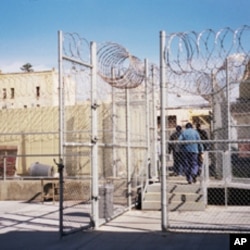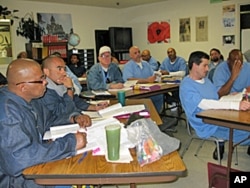A college education is out of reach for most state and federal prisoners. California’s San Quentin is one of the few prisons in the country that offers college-level courses.
Jody Lewen has run the facility’s college program for over a decade and she's the reason that the Prison University Project exists today.
Taking charge
When Lewen joined San Quentin's college program in 1999 as a volunteer instructor, it was run by a small volunteer staff with no budget. At that time, she was a graduate student, with plans to return to academic research. But a year later, when the part-time director suddenly quit, Lewen found herself in charge.
"I thought for a long time it was just temporary and that somebody else was going to keep the program running," she says. "But once I started doing the work and got more deeply involved, I also began to see the potential the program had. And I started to think more and more about what this program could become. There was nobody else to run it. And I thought it would just be one of those failures for the rest of my life if I let it fold.
Expanded program
Under Lewen’s leadership, the Prison University Project has expanded, now offering 20 classes in English, math, the humanities, social science and Spanish. Three hundred inmates enroll every semester, earning college credits which can lead to an associate of arts degree. Lewen has recruited more than 150 volunteer teachers and graduate students from nearby colleges and universities. She says attracting teachers is not difficult, although some of the new instructors are nervous their first time at San Quentin.
"When I talk to people about this work, very often they assume that the students are very aggressive and very difficult, all the stereotypes people have in their minds about people who are incarcerated," says Lewen. "They assume they're a lot of troublemakers and are goofing off and they don't want to do their work. That stereotype has nothing to do with reality."
Sookyoung Lee teaches a class on critical thinking and research. She finds her students are curious and engaged.
"I'm super surprised at how nice the students are. Most of the times, students are extremely respectful, way more motivated than the Cal [University of California at Berkeley] undergrads," says Lee. "It's always a pleasure for the teachers when the students are not taking learning for granted."
Hope for the future
Charles Spence is serving a life sentence in San Quentin and has a few more courses left to finish his associate's degree. He hopes to be paroled some day and wants to earn his master's degree in psychology.
"This experience really has changed my life. It's given me a lot of tools on how to express myself," says Spence. "This program is really rare in the prison setting, so I'm really lucky. All of the guys feel the same. We're really lucky to have the opportunity to get education, especially the way the economy is now. The odds are stacked against us when we get out, being convicted felons. This actually gives us a lot of hope and hopefully will help us succeed when we walk out the door."
So far, 100 San Quentin prisoners have graduated with associate's degrees and many more have continued their college studies after release. Research shows that the more education a prisoner has, the less likely he is to return to prison. Lewen says the recidivism rate among prisoners with college degrees is less than 10 percent.
"I remember one student saying to me 'This college program is the best drug treatment program in the world.' And it was interesting because at first I really didn't understand what he meant," says Lewen. "And he was just saying 'This program gives you hope and to stay clean and to live a healthy life, you need to have hope.'"
The Prison University Project survives on donations and foundation grants and receives no government funding. Lewen would like to see college programs in every prison but without government support, it's not likely to happen any time soon. In the meantime, there's a long waiting list of San Quentin prisoners who want to enroll in the college program. Some day, Lewen hopes to expand her program, making a college education available for most of the 5,500 prisoners currently housed at San Quentin.







